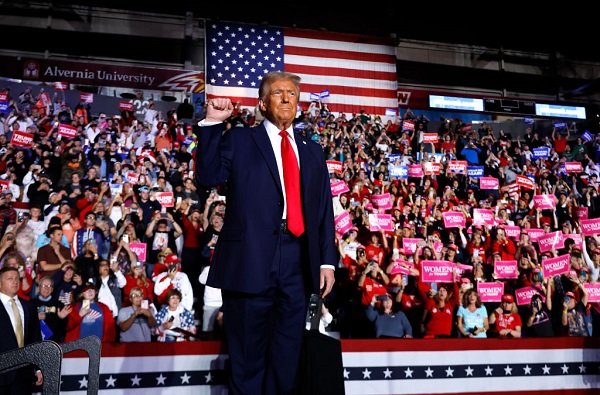International
Trump victory speech: ‘Many people have told me that God spared my life for a reason’

From LifeSiteNews
Donald Trump has said that “many people have told me that God spared my life for a reason” during his victory speech after the 2024 presidential election.
In the early hours of November 6, Trump gave his victory speech at West Palm Beach in Florida, calling his campaign “the greatest political movement of all time.” He said the country saw a “historic realignment, uniting citizens of all backgrounds behind a common core of common sense.” His election will lead to a “Golden Age of America,” Trump stated.
“Many people have told me that God spared my life for a reason, and that reason was to save our country and restore America to greatness,” Trump proclaimed, referencing the failed assassination attempt on July 13 during a rally in Pennsylvania.
“I will govern by a simple motto: ‘Promises made, promises kept’,” Trump declared during his speech.
One of these promises was ending the war in Ukraine and in the Middle East, which Trump referenced during his address.
Citing his previous term as President of the United States, he said: “We had no wars, except we defeated ISIS in record time.”
“They said, ‘He will start a war!’ I’m not going to start a war; I’m going to stop wars!” Trump stated, likely alluding to his promises to broker peace deals in Ukraine and the Middle East.
While Trump has not been officially declared the winner of the 2024 presidential election, he is projected to win the Electoral College to become the 47th president of the United States, defeating Democratic Vice President Kamala Harris.
Republicans are also projected to win control of the Senate with at least 51 seats, though control of the House is not known yet.
Business
Canada may escape the worst as Trump declares America’s economic independence with Liberation Day tariffs

 MxM News
MxM News
Quick Hit:
On Wednesday, President Trump declared a national emergency to implement a sweeping 10% baseline tariff on all imported goods, calling it a “Declaration of Economic Independence.” Trump said the tariffs would revitalize the domestic economy, declaring that, “April 2, 2025, will forever be remembered as the day American industry was reborn.”
Key Details:
-
The baseline 10% tariff will take effect Saturday, while targeted “reciprocal” tariffs—20% on the EU, 24% on Japan, and 17% on Israel—begin April 9th. Trump also imposed 25% tariffs on most Canadian and Mexican goods, as well as on all foreign-made cars and auto parts, effective early Thursday.
-
Trump justified the policy by citing foreign trade restrictions and long-standing deficits. He pointed to policies in Australia, the EU, Japan, and South Korea as examples of protectionist barriers that unfairly harm American workers and industries.
-
The White House estimates the 10% tariff could generate $200 billion in revenue over the next decade. Officials say the added funds would help reduce the federal deficit while giving the U.S. stronger leverage in negotiations with countries running large trade surpluses.
Diving Deeper:
President Trump on Wednesday unveiled a broad new tariff policy affecting every imported product into the United States, marking what he described as the beginning of a new economic era. Declaring a national emergency from the White House Rose Garden, the president announced a new 10% baseline tariff on all imports, alongside steeper country-specific tariffs targeting longstanding trade imbalances.
“This is our Declaration of Economic Independence,” Trump said. “Factories will come roaring back into our country — and you see it happening already.”
The tariffs, which take effect Saturday, represent a substantial increase from the pre-Trump average U.S. tariff rate and are part of what the administration is calling “Liberation Day” for American industry. Reciprocal tariffs kick in April 9th, with the administration detailing specific rates—20% for the European Union, 24% for Japan, and 17% for Israel—based on calculations tied to bilateral trade deficits.
“From 1789 to 1913, we were a tariff-backed nation,” Trump said. “The United States was proportionately the wealthiest it has ever been.” He criticized the establishment of the income tax in 1913 and blamed the 1929 economic collapse on a departure from tariff-based policies.
To underscore the move’s long-anticipated nature, Trump noted he had been warning about unfair trade for decades. “If you look at my old speeches, where I was young and very handsome… I’d be talking about how we were being ripped off by these countries,” he quipped.
The president also used the moment to renew his push for broader economic reforms, urging Congress to eliminate federal taxes on tips, overtime pay, and Social Security benefits. He also proposed allowing Americans to write off interest on domestic auto loans.
Critics of the plan warned it could raise prices for consumers, noting inflation has already risen 22% under the Biden administration. However, Trump pointed to low inflation during his first term—when he imposed more targeted tariffs—as proof his strategy can work without sparking runaway costs.
White House officials reportedly described the new baseline rate as a guardrail against countries attempting to game the system. One official explained the methodology behind the reciprocal tariffs: “The trade deficit that we have with any given country is the sum of all trade practices, the sum of all cheating,” adding that the tariffs are “half of what they could be” because “the president is lenient and he wants to be kind to the world.”
In addition to Wednesday’s sweeping changes, Trump’s administration recently imposed a 25% tariff on Chinese goods tied to fentanyl smuggling and another 25% on steel and aluminum imports—revoking previous carve-outs for countries like Brazil and South Korea. Future tariffs on semiconductors, pharmaceuticals, and raw materials such as copper and lumber are reportedly under consideration.
Trump closed his remarks with a message to foreign leaders: “To all of the foreign presidents, prime ministers, kings, queens, ambassadors… I say, ‘Terminate your own tariffs, drop your barriers.’” He declared April 2nd “the day America’s destiny was reclaimed” and promised, “This will indeed be the golden age of America.”
2025 Federal Election
‘I’m Cautiously Optimistic’: Doug Ford Strongly Recommends Canada ‘Not To Retaliate’ Against Trump’s Tariffs


From the Daily Caller News Foundation
By Jason Cohen
Ontario Premier Doug Ford urged Canadian Prime Minister Mark Carney to avoid retaliation against the tariffs President Donald Trump announced on Wednesday.
Trump announced in the White House Rose Garden that he would impose “a minimum baseline tariff of 10%” on all goods entering the United States, with Canada not being included on the list of countries with higher rates. When asked about what Canada’s response would be on “Bloomberg: Balance of Power,” Ford said he was “cautiously optimistic” about Canada’s omission from the higher-tier tariffs and emphasized the importance of a cooperative relationship with the U.S.
WATCH:
“Well, let’s see where these tariffs go. I’m cautiously optimistic that I never saw Canada or Mexico on that list. And it just goes to show you two great countries working together, collaborating together and building relationships,” Ford said. “So again, I’m cautiously optimistic. I think if that’s the case, it’s the right thing for both the U.S and Canada.”
Host Kailey Leinz noted that there are currently tariffs on Canada in place as well as an exemption for goods that are in compliance with the U.S.-Mexico-Canada Agreement (USMCA).
“Does that mean, sir, at least in your mind, that it wouldn’t be appropriate for Canada to retaliate for this at this time?” Leinz asked.
“That is correct. If that’s the case, then I would highly recommend to the prime minister not to retaliate. And let’s carry on a strong relationship,” Ford answered. “Let’s build the American-Canadian fortress around both countries and be the wealthiest, most prosperous, safest two countries in the world.”
Trump declared a national emergency to levy a slew of reciprocal tariffs on what he has deemed “Liberation Day.”
“My fellow Americans, this is Liberation Day, April 2, 2025, will forever be remembered as the day American industry was reborn, the day America’s destiny was reclaimed, and the day that we began to make America wealthy again,” Trump said.
The president also announced that he would proceed with implementing a 25% tariff on “all foreign-made automobiles” that will take effect at midnight.
Ford in March had imposed a 25% surcharge on electricity to New York, Michigan and Minnesota, but promptly rescinded the policy and apologized to Americans on WABC’s “Cats & Cosby” radio show the following day. The tariffs were a retaliatory measure against Trump’s flurry of tariffs against Canada since starting his second term.
-

 2025 Federal Election1 day ago
2025 Federal Election1 day agoMark Carney refuses to clarify 2022 remarks accusing the Freedom Convoy of ‘sedition’
-

 2025 Federal Election2 days ago
2025 Federal Election2 days agoLiberal MP Paul Chiang Resigns Without Naming the Real Threat—The CCP
-

 2025 Federal Election2 days ago
2025 Federal Election2 days agoPM Carney’s Candidate Paul Chiang Steps Down After RCMP Confirms Probe Into “Bounty” Comments
-

 Business1 day ago
Business1 day agoSaskatchewan becomes first Canadian province to fully eliminate carbon tax
-

 2025 Federal Election2 days ago
2025 Federal Election2 days agoFight against carbon taxes not over yet
-

 Automotive1 day ago
Automotive1 day agoElectric cars just another poor climate policy
-

 Business2 days ago
Business2 days agoTrump says ‘nicer,’ ‘kinder’ tariffs will generate federal revenue
-

 Energy1 day ago
Energy1 day agoWhy are Western Canadian oil prices so strong?





